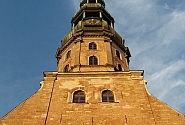
The property rights of St. Peter’s Church in Riga are transferred to the foundation of the Riga St. Peter’s Church, the Saeima decided on Thursday, 24 March. The draft Law on St. Peter’s Church, adopted in the third and final reading, provides for the gratuitous transfer of the St. Peter’s Church to the foundation established by the Evangelical Lutheran Church of Latvia and the German St. Peter’s congregation of the Evangelical Lutheran Church of Latvia.
“The Riga St. Peter’s Church is one of Latvia’s most important cultural and historical monuments, it is an absolutely dominant historical feature of Riga, attributing Riga to the Christian cultural space of Western Europe. At present, the church as a cultural monument is in a critical state and there is an urgent need for extensive, fundamental reconstruction works. We hope that the law adopted by the Saeima will be a good start for the revival of the St. Peter’s Church in its original form," stressed Arvils Ašeradens, Chair of the Education, Culture and Science Committee on responsible for the progress of the draft law.
The purpose of the law is to ensure the preservation and protection of the Riga St. Peter’s Church and its cultural and historical value, as well as its public use. The registration of the ownership of the real estate in the name of the foundation of the Riga St. Peter’s Church with the Land Register includes a note stating that the real estate is a cultural monument of national significance and a part of an urban building monument and archaeological monument of national significance.
The law states that the Riga St Peter’s Church is primarily a house of worship used to carry out religious activities, including the important role it plays as a monument of cultural history and, a venue of various events. The Riga St. Peter’s Church will be accessible to religious organisations of Christian confessions historically associated with the church to carry out their religious activities on the basis of mutual agreement with the foundation. The foundation will ensure the availability of the Riga St Peter’s Church by coordinating and agreeing with those natural and legal persons who use the Riga St Peter’s Church to perform the functions laid down in the law.
The law includes the obligation for the foundation to ensure the preservation, renovation and, in particular, restoration of the property as a cultural monument of national significance, as well as to ensure public access. The foundation is also subject to other obligations, including to develop and coordinate with the Ministry of Culture the concept of preservation, restoration and use of the property, as well as to provide the Ministry with an annual report on its performance.
The law also provides for parliamentary supervision over the preservation, restoration, and use of the property, stating that the Ministry of Culture, as the supervising body, will be tasked with evaluating the report submitted by the foundation and provide its opinion once a year to the Education, Culture and Science Committee of the Saeima on the compliance of the performed activities.
The law also regulates the territory adjacent to the Riga St. Peter’s Church, stating that its main purpose is to ensure the visual perception and functionality of the building. The law also includes restrictions on the use of the adjacent area, including a prohibition on the construction of new buildings.
Funding for the preservation, restoration and maintenance of the Riga St. Peter’s Church will be provided and attracted by the foundation, while the income obtained as a result of economic activities carried out by the Church may be used only for the restoration, maintenance and ensuring of public access to the Riga St. Peter’s Church.
“Today, our common duty is to cooperate and support the foundation’s efforts to return this cultural monument to its original brilliance, attesting to Latvia’s belonging to the Western cultural space,” said Mr. Ašeradens.
Saeima Press Service









